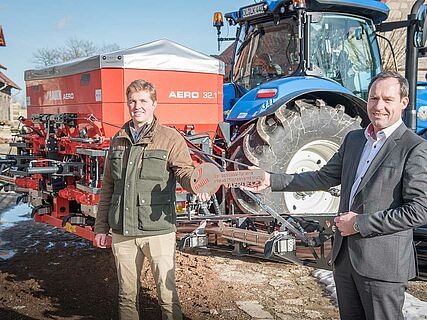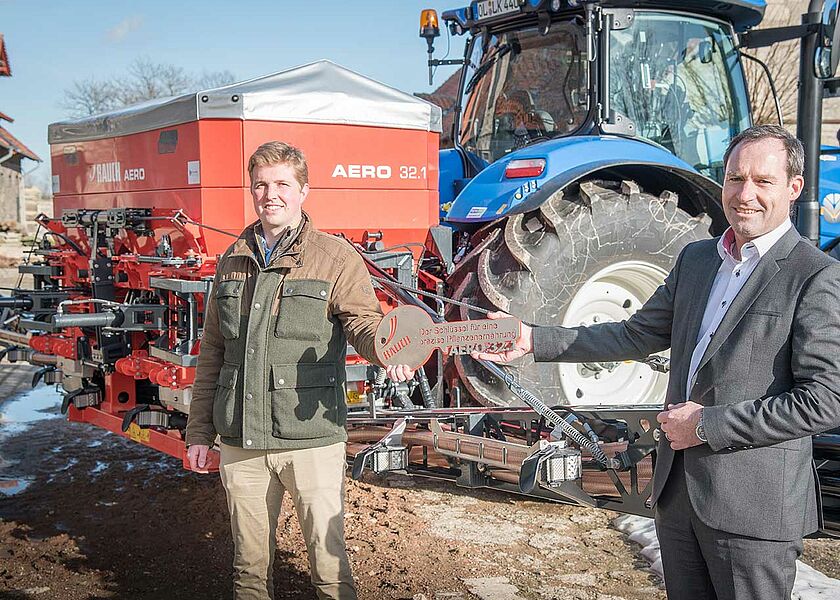
State-of-the-art agricultural machines for digitally controlled precision tests
PraxisLabors Digitaler Ackerbau has received a new addition to its machine park. The manufacturer RAUCH is handing over the first AERO 32.1 pneumatic spreaders to the Chamber of Agriculture for the German state of Lower Saxony.
Deploying the most modern digital machines and applications for agriculture under operational conditions is the task of the experts in the Lower Saxony Chamber of Agriculture’s (CA) PraxisLabor Digitaler Ackerbau. The project is being promoted by the Lower Saxony Ministry for Agriculture and is being implemented on the lands of the CA test station at Schickelsheim, Königslutter am Elm, in the district of Helmstedt. It is now available there as the first example of a latest-generation pneumatic fertiliser spreader.
Representatives of the manufacturer RAUCH Landmaschinen GmbH from Sinzheim (Rastatt/ Baden-Württemberg district) – including Dr. Norbert Rauch, who has been head of the company for many years and is a developer of fertiliser spreaders – as well as employees from the responsible dealers Michalek from Lehrte near Hanover officially handed over the device from the AERO 32.1 series on Friday (19 February) in Schickelsheim to the Chamber President Gerhard Schwetje. “What makes this new device so interesting for us is, in particular, the innovative technology for more precise handling of fertiliser, which will be increasingly required in future”, says Schwetje about the new machine, which was awarded the tender as part of a public procurement process.
RAUCH has a long tradition in manufacturing pneumatic fertiliser spreaders. Between 1981 and 2007, the company manufactured and sold 4,500 machines from the series AERO 1012 to AERO 2224. “It was always our biggest concern to further develop our highly precise machines in order to meet the constantly growing demand for optimal plant nutrition”, says Wilfried Müller, Managing Director at RAUCH Landmaschinenfabrik GmbH. “With the new precision spreaders, we have redefined tried and tested technology and reached another milestone in the future-oriented dosing and distribution of fertiliser.”
Fertiliser spreaders are used in agriculture to supply crops with different nutrients such as nitrogen, phosphorus and potassium. During tests at the CAs PraxisLabor laboratory, fertilisation relies on a high level of precision – a requirement that standard centrifugal spreaders cannot fulfil to the same degree.
“The horticultural tests at PraxisLabor had, among other goals, the task of making handling fertiliser through digital processes more efficient and economical in daily operations – as envisaged in the species conservation agreement “Der Niedersächsische Weg [The Lower Saxony Way]”, reports the Chamber President.
“The new pneumatic fertiliser spreader is controlled with the help of data collected from sensors, drones and satellites – with this the device will, and preferably within its working width, adjust the dosing of the nitrogen fertiliser as flexibly as possible to the actual requirements of the plants”, explains Dr. Harm Drücker, head of the specialist department Energy, Construction, Technology at the CA.
“This means, for example, that the machine almost completely leaves out individual areas when travelling over them and takes account of other areas, including asymmetric areas, with higher nitrogen requirements”, explains Drücker.
“Through the numerous small spreading assemblies, with the new models the fertiliser is distributed with the highest possible precision and to a high level of detail with a low susceptibility to wind, when compared with standard centrifugal spreaders”, adds Jobst Gödeke, head of PraxisLabor. “This is a big advantage, for example in being able to fertilise precisely when dealing with edge areas of sensitive field borders and habitats.”
Using the latest digital agricultural and sensor technology that is available on the market, the experts in plant cultivation tests in PraxisLabor determine, through tests and projects, the effects of the digital applications on the agricultural processes and work management, as well as the natural resources of soil, water, climate and biodiversity.
With the knowledge gained based on the high standards of the CA field testing body, the Chamber of Agriculture of Lower Saxony will support farmers in future regarding consultation and training opportunities and will also supply public authorities with valid data.
Caption: Wilfried Müller (Managing Director RAUCH Landmaschinenfabrik GmbH, right) hands over the symbolic key for the innovative pneumatic fertilizer spreader to Jobst Gödeke (Head of PraxisLabor Digitaler Ackerbau) in front of the LWK-Versuchsstation in Schickelsheim (Königslutter/ Kreis Helmstedt).
Photo: Ehrecke/Landwirtschaftskammer Niedersachsen

![[Translate to English:] [Translate to English:]](/fileadmin/_processed_/5/d/csm_20210222_RAUCH_Erstuebergabe_AERO32.1_2w_b77e4d282f.jpg)
![[Translate to English:] [Translate to English:]](/fileadmin/_processed_/8/5/csm_20210222_RAUCH_Erstuebergabe_AERO32.1_3w_8d697bbcfe.jpg)